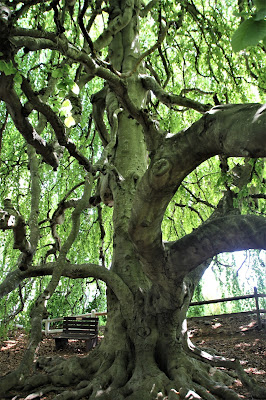Readings: Gn 1:1-19 • Ps 104 • Mk 6:53-56
____________________
I was all grumbly for
a few weeks because they ran out of vaccine and canceled my vaccine date. Diane
looked at me, shook her head and said, “And you’re the one always telling
others not to worry, so let’s just pray that God’s will be done.” That's what we
did and within a week they told us to pick a date, and we got our shots last
Wednesday.
God is present, folks,
always present, always here with us. We certainly see this in today's
readings -- readings that cover it all.
First, we’re taken
back to the very beginning of time and space: “In the beginning, God…”
Yes, those four words
that begin the Book of Genesis are really enough, and tell us that in the
beginning it was only God. He needed nothing. He certainly didn’t need
creation. His creative act resulted from His free will, a will that desired to
make creatures who would share in His divine life. Quite simply, the world
was made in an act of love for the glory of God. As we read in the Book of
Revelation:
“Worthy are you, Lord our God, to receive glory and honor and power, for you created all things; because of your will they came to be and were created” [Rev 4:11].
Creation, then, is a
remarkable act of love that sets the stage for all that follows. God speaks
His Word and Creation happens. Have you ever considered how Eucharistic that
is?
That’s right, when
Jesus, the Incarnate Word, speaks, “This is my Body…This is
my Blood,” wonderful things happen…and He is here, in a very Real
Presence, another manifestation of God’s ongoing creative love.
And it’s in the Gospel
where we encounter that Incarnational love in a very personal way. There
we see the Word bringing His healing power to us, awakening us to the reality
of God’s Presence, for it’s always a healing Presence.
Mark takes us along
the Sea of Galilee to Gennesaret where we encounter a people who could hardly
contain themselves. How did Mark put it? Having recognized Jesus, they
“scurried about the surrounding country” to bring the sick to Jesus, wherever
He was.
Can you picture that?
Dozens of people, perhaps hundreds, carrying the sick and disabled, leading the
blind and the deaf, the roads and footpaths filled with those in need of
healing. Wherever he went – every town, every little village – He found
the sick laid out in the town square, just waiting for His healing Presence – a
word, a touch.
According to Mark the
ill sought only to touch his clothing -- this was enough to bring
healing. Their faith, their trust in Jesus’ healing Presence was all it
took. That and the infectious faith of those who carried them to Jesus.
It is the same deep faith we encounter in the 20th century saint, St. Josephine Bakhita, whose memorial we celebrate today. A remarkable woman – an African from the Sudan, she was born in 1869, kidnapped at 12 by Arab slave traders. She spent years in slavery, bought and sold frequently, and often treated horribly by those who enslaved her.
A long torturous path led her to Italy and the convent of the Canossian Daughters of Charity in the town of Schio, near Venice. From the sisters she learned of Jesus Christ, and was baptized, received First Communion and Confirmation, all on the same day by Cardinal Sarto of Venice, who would go on to become Pope St. Pius X.
Lovingly known by the
people of Schio as their Black Mother, she often prayed for her kidnappers, and
thanked them publicly. Had she not been kidnapped, she might never have come to
know Jesus Christ and entered His Church. In World War II, the townspeople regarded
her as their protector, and although bombs fell on their village, not one
citizen died.
During her painful,
final illness she remained ever cheerful, happy to suffer for the good of
others: “As the Master desires,” she would say. She knew exactly what Paul
means when he said, “All things work for good for those who love God,
who are called according to His purpose” [Rom 8:28] She died on
this day in 1947, so she’s a kind of contemporary to many of us who were born
while she was still alive.
I think of St.
Josephine and the people of Gennesaret and my own petty troubles just melt away
into insignificance.
Like St. Josephine,
are we filled with joy because of the Real Presence of our Lord, Jesus Christ?
The Eucharist, too, is a healing Presence, just like Jesus’ Presence in the
towns of Galilee. Do you come here today with the assurance that God will
heal you in ways you can never imagine?
Do you “scurry about”
like the people of Gennesaret looking for others in need of healing, telling
them about Jesus’ Eucharistic Presence, His healing Presence?
Maybe it’s time we all
did a little scurrying, and a lot less worrying.

















